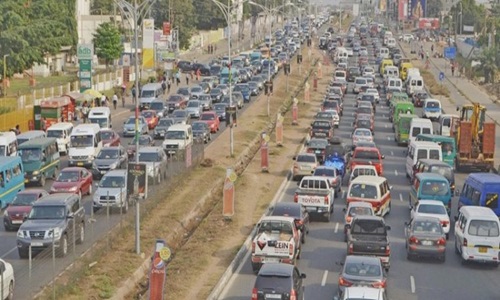Traffic congestion in Accra: A wake-up call for sustainable transportation solutions
Raising awareness about the consequences of traffic violations, reducing corruption within law enforcement agencies, and implementing strict penalties for traffic offenders are essential steps towards restoring order on the roads.
- Advertisement -
Accra, the vibrant capital city of Ghana, is renowned for its lively markets, cultural diversity, and booming economy. However, alongside these positive attributes comes a growing challenge that is hard to ignore – traffic congestion.
As the city’s population expands rapidly, its infrastructure is struggling to keep pace. It is imperative to delve into the causes, consequences, and potential solutions to tackle this pressing issue.
- Advertisement -
The causes
- Advertisement -
One of the primary drivers of traffic congestion in Accra is the explosive growth of motor vehicles without a corresponding expansion of road infrastructure.
The burgeoning middle class’s increased purchasing power has led to a surge in car ownership, resulting in an overwhelming number of vehicles on the roads.
Additionally, the rapid urbanization of areas has created a higher demand for transportation services, further straining the existing infrastructure. Moreover, inadequate and substandard public transportation systems have left many citizens with no alternative but to rely on private vehicles due to limited reach, reliability, efficiency, and quality.
A lack of investment in mass transit systems, such as buses and trains, exacerbates congestion levels.
Inefficient traffic flow management, traffic law violations, and inadequate road maintenance play a significant role in worsening traffic congestion.
The lack of sufficient traffic police presence and enforcement of traffic regulations has led to widespread disregard for traffic rules, causing chaos and gridlock at major intersections like the University of Professional Studies, Accra (UPSA) Junction on the Legon-Madina Road.
The consequences
The consequences of traffic congestion in Accra ripple across various aspects of daily life.
Economically, the significant time wasted in traffic translates to substantial productivity losses.
Companies face delays in the delivery of goods and services, and employees arriving late to work threaten profitability, hindering economic development.
Furthermore, traffic congestion negatively impacts the well-being of individuals and the environment.
Longer commuting times and exposure to pollution harm the physical and mental health of citizens.
Excessive emissions of greenhouse gases and pollutants from exhaust fumes contribute to climate change and air pollution, further worsening overall environmental degradation.
This poses a threat to Ghana’s progress towards achieving Sustainable Development Goals (SDG) Goal 13, which calls for urgent action to combat climate change and its impacts.
- Advertisement -
The solutions and the way forward
Addressing traffic congestion in Accra necessitates a multifaceted approach that focuses on improving both road infrastructure and public transportation services while promoting sustainable alternatives.
Investment in expanding and upgrading road networks by the government is vital.
The construction of new lanes, overpasses, and flyovers can increase road capacity and alleviate bottlenecks.
Furthermore, maintaining and repairing existing roads is essential to ensure smoother traffic flow.
Prioritizing the development of an effective and reliable public transportation system is imperative.
Investing in the expansion of bus networks, implementing dedicated bus lanes, and integrating different modes of public transport, such as buses and trains, can encourage citizens to shift away from private vehicles.
Additionally, introducing incentives for carpooling schemes or establishing carpooling lanes can help alleviate congestion and reduce individual vehicle usage.
Encouraging the use of bicycles and non-motorized transport options through the creation of dedicated lanes and safe infrastructure contributes to a greener and more sustainable transport system.
Lastly, to enforce traffic regulations effectively, improving traffic management and police presence is crucial.
Raising awareness about the consequences of traffic violations, reducing corruption within law enforcement agencies, and implementing strict penalties for traffic offenders are essential steps towards restoring order on the roads.
The issue of traffic congestion in Accra demands urgent attention and collective efforts from both the government and citizens.
By investing in sustainable transportation solutions, including improving road infrastructure and public transportation systems, Accra can move towards a more efficient, environmentally friendly, and less congested city.
With these measures, Accra’s residents can look forward to a future where traffic congestion becomes a distant memory, improving their quality of life and fostering economic growth.
The writer is a student pursuing MSc Urban Studies, University of Ghana – Centre for Urban Management Studies.
Source:Lawrence Martey Commodore, zedmultimedia,
- Advertisement -



